Volume Eight – 1714 – 1760
The Early Hanoverians
GEORGE THE FIRST (1714 – 1727)
THE KING’S MISTRESSES
GEORGE THE SECOND (1727 – 1760)
GEORGE FREDERCK HANDEL
ALEXANDER POPE
BONNIE PRINCE CHARLIE’S ESCAPE AND DEATH
INDUSTRIAL REVOLUTION
SAMUEL JOHNSON
JAMES WOLFE
DEATH OF GEORGE THE SECOND
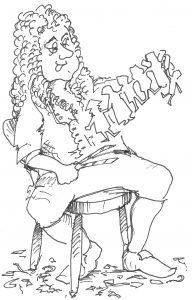
GEORGE THE FIRST (1714 – 1727)
When poor Queen Anne finally breathed her last,
Few were surprised. She had been sinking fast.
King George it was who now moved centre stage.
The German’s character was hard to gauge.
Some claimed he had a pretty, ready wit;
Others saw precious little sign of it.
At fifty-four a middle-aged figure,
Nonetheless the new King displayed vigour
And rude good health. His massive appetite
Was already a legend. Far from bright,
He inherited from his poor mother
Her passion for long walks, nothing other.
Languages? Pah! He spoke broken French
And barely any English. A great wrench
It was for him to leave his native state.
There he could speak German at any rate.
The arts (“boets and bainters”) he abhorred,
Though opera and music struck a chord.
Hunting, gaming and women, so we are told,
Were his passions. His subjects left him cold.
Shy and withdrawn, he was low on the skills
Expected of a King. Worst of these ills
Was his woeful lack of personal charm.
Though hardly a pressing cause for alarm,
One habit of his that provoked sniggers
Was his cutting out of paper figures.
Hours he’d spend on this bizarre pastime,
A quaint, if harmless, little pantomime.
Back to top / Buy the book
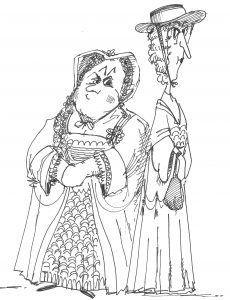
THE KING’S MISTRESSES
Hanoverian George (as we’ll call him)
Enjoyed a huge appetite for women.
His coming to England was attended
By two mistresses, no less: the splendid
Ehrengard Melusina von Schulenberg –
Was ever a title quite so absurd? –
And Charlotte Sophia Kielmansegge.
The King, in short, was a lucky beggar:
Two mistresses! Or was he? Old Ehrengard –
Maîtresse en titre – was held in low regard,
At least by the British. Bony and thin,
Scrawny and lanky and sharp as a pin,
This German phenomenon was greedy,
Voracious, power-mad and needy.
Moreover, she was superstitious,
Dim-witted and deeply religious.
Sixty if she was a day, the old trout
Was a snake-in-the-grass, without a doubt.
Mixed metaphors, sorry… Never mind that.
Where Ehrengard was thin, Charlotte was fat.
Horace Walpole met her as young boy
And offered this pen-portrait (far from coy).
The poor child professed himself terrified
By the apparition. Full as wide
As she was long, she boasted two “fierce” eyes,
“Black and rolling”, of quite enormous size,
Set beneath “two lofty arched eyebrows”. Vast
Were her cheeks (little Horace was aghast) –
“Two acres” they measured, spread with crimson.
Coquettish nonetheless (some said winsome),
She won George’s heart. Her “ocean of neck…
“Overflowed… her lower parts” (flippin’ heck!),
No inch of her body “restrained by stays”.
Good for her. Kielmansegge deserves praise.
Better than today, when the world expects
Women to walk around like stick insects.
Even Charlotte’s worst enemies confessed
To her brightness of spirit. To suggest
(God forbid) that her case smacked of incest
Would be a sin, a terrible libel.
Yet to swear otherwise, on the Bible,
Were impossible. For Charlotte’s mother
Had been George’s dad’s mistress. Oh, brother –
One awful scandal after another.
Whatever the rumours, George didn’t care.
Charlotte’s mum, as far as he was aware,
Was notoriously promiscuous.
It was manifestly ridiculous
To assume that his beloved Charlotte
Was his half-sister. A thoroughly bad lot
Was George. In my book what takes the biscuit
Is the mere fact he was prepared to risk it.
The obese Kielmansegge, however,
And the skinny Schulenberg, whatever
The parentage of the former, were both
Hugely unpopular and nothing loth
To exploit their high favour with the King
To feather their nests. This was sickening.
George’s subjects harboured a strong loathing
For the grisly pair. I’d say, on the whole,
Their nicknames (though cruel) were fitting and droll,
If predictable: ‘Elephant’ and ‘Maypole’.
Back to top / Buy the book
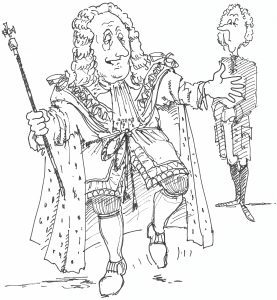
GEORGE THE SECOND (1727 – 1760)
Walpole had the job of telling the King
(The new one) tidings which, if anything,
Would afford him joy: his father’s demise.
Young George was having one of his ‘long lies’
(A euphemism this) with Caroline,
His beauteous wife. Well, the royal line
Must be peopled! Now, this was flaming June
And Walpole pitched up in the afternoon
At Richmond Palace. It may sound absurd,
But George was adamant: “Do Not Disturb!”
His valet de chambre was resistant
To Walpole’s request. Bob was insistent:
The King must be ‘woken’, and woken now –
No dithering. George was livid, and how!
He ambled down, his breeches half-undone,
A right royal shambles (pardon the pun),
To be met by Walpole, down on his knees
(All twenty stone), and informed, if you please,
That now he was King. “That is a big lie,”
He’s alleged to have said. No idea why.
Some thirty-three years later, quite alone,
King George the Second would die on the throne.
Please forgive this lapse into levity –
For ‘throne’ read ‘loo’. Life, in its brevity,
Deals a deadly hand. It’s a funny thing,
But George, for his sins, was told he was King
With his buttons undone (in open court)
And died on the lav (a sobering thought).
Back to top / Buy the book
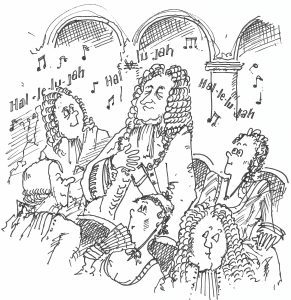
GEORGE FREDERCK HANDEL
George Frederick Handel, the best of men,
Was employed by George (in 1710)
As his Kapellmeister in Hanover.
Handel wasn’t exactly bowled over
By life in George’s Herrenhausen Court –
All very boring, just boozing and sport.
He was twenty-five years old, after all.
Prospects of further advancement were small.
Handel, however, had achieved success
With opera – in Italy, no less.
A smash hit he enjoyed with Rodrigo,
Then tried his hand at oratorio.
This followed a farcical papal ban
On opera. From Florence to Milan
The word spread. La Resurrezione
Was a triumph in Rome. Il Sassone
(The Saxon) was George Frederick’s nickname.
He acquired, if not fortune, local fame.
But his post in Hanover paid the rent.
It was welcome, at least, to this extent.
Later in 1710 he sought leave
To pay London a visit. Up his sleeve
Was another opera, Rinaldo –
A sell-out success. Il Pastor Fido
Fared rather less well, as did Teseo,
Both performed on a subsequent visit
(In 1712). Life’s not fair, is it?
For both these works are frankly exquisite.
Handel’s popularity, nonetheless,
Grew and grew. A measure of his success
Was a new commission from Queen Anne
For her birthday music. A massive fan,
She granted him two hundred pounds a year –
A pension. The Elector, I fear,
(George of Hanover, as his boss still was),
Was far from content, if only because
He (George) wanted Handel all to himself.
Anne, never in the most robust of health,
Died, as you know, in 1714.
As Elector George succeeded the Queen,
Handel he ‘inherited’ (as it were).
The great composer had no cause to stir
From England again. A nice irony,
Given it’s where he was happy to be.
A most lucky accident. The new King
Was thrilled and proved most accommodating.
Handel’s pension he doubled. The rest
Is music history. Among the best,
George Frederick’s finest: The Messiah…
The Water Music… He was on fire!
Handel died in his seventy-fifth year,
Shortly before George the Second, I fear.
Here is what Ludwig van Beethoven said
(This is a quote): “I would cover my head
“And kneel before his tomb.” Take it as read,
Ludwig knew what he was talking about.
Handel had genius, beyond all doubt:
“He was the greatest composer” (some praise)
“That ever lived.” So he ended his days.
Back to top / Buy the book
ALEXANDER POPE
The undisputed poet of the age
Was Alexander Pope. How he’d enrage
His critics! In his famous Dunciad
He demonstrated the fun to be had
In destroying his foes – or the malice,
Rather. Satire is a poisoned chalice
In the hands of a twisted misanthrope.
This was the character, sadly, of Pope.
One example. Lord Hervey unwisely
Picked a quarrel. Pope, unsurprisingly,
Bit back with bile. “This painted child of dirt”
His Lordship became. How this must have hurt.
“Master” or “miss”? He acted either part,
With “trifling head” and a “corrupt heart”.
This (can you credit?) was only the start.
I won’t go on. The Dunciad this is.
I strongly advise you, give it a miss.
What brought Pope fame were his facility
Of phrase, his technical agility,
And his astonishing ability
To articulate the most commonplace
Of ideas with true poetic grace.
Form was all. As sharp and neat as a pin
Were his wit, his classical discipline
And his learning. Hang the cynicism!
Pope’s wondrous Essay on Criticism
Shows him at his best. Aged just twenty-three,
He distilled all critical theory,
All critical thought since Aristotle,
Into iambics! That takes some bottle.
Pope was on top form too (at full throttle,
Dare I say it) with The Rape of the Lock.
This mock-heroic satire was a shock,
So entertaining a work from this deep,
Earnest young man. You can laugh fit to weep,
Still, at the wonderfully trivial,
Witty diversion, convivial
Yet artful. A lock of Miss Fermor’s hair
Is snipped off by Lord Petre. Cue: despair!
The ‘epic’ works on many a layer:
A stylish romp; a social satire;
An heroic parody. Admire,
I beseech you, its brilliant allure,
Its perfect polish. You’ll love it, for sure.
I can’t confess to being a great fan,
But some profess that his Essay on Man
Is Pope’s finest. “Presume not God to scan,”
He writes. “Know then thyself… ” An odd, cold fish
Was Alexander, dry and stand-offish.
Of stunted growth he was since birth, poor chap,
Lonely, obsessive and ready to snap.
Let George the Second have the final word.
The King, we know, thought poetry absurd.
Advising Lord Hervey to avoid verse –
Poets were fanciful, vain and perverse –
Rhyming, he said, was a slippery slope.
Best “leave such work to little Mr. Pope”.
Back to top / Buy the book
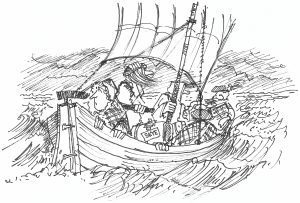
BONNIE PRINCE CHARLIE’S ESCAPE AND DEATH
Flora Macdonald was just twenty-four
When she met the Prince. Her jaw hit the floor.
She knew, of course, she was breaking the law
When a family friend, Captain O’Neil,
Casually asked her how she would feel
About helping Charlie over to Skye.
A brave young lassie, she didn’t ask why.
She gave her word and was glad to comply.
One fly in the ointment, hard to deny,
Was the head of the ‘hunt-the-Prince’ posse,
Sir Alex Macdonald (blunt and bossy) –
Step-father, no less, to our wee Flossie.
Flora cleverly exploited this fact,
Obtaining from Alexander (with tact,
And a fair dose of subterfuge) a ‘pass’
To cross to Skye. If this sounds like a farce,
It was. For on board was one ‘Betty Burke’
(An ‘Irish spinster and maid-of-all-work’),
A manservant, Flora and six boatmen.
Our Betty (you guessed, ten out of ten)
Was the Prince in person, got up in drag,
And so he escaped, the great scallywag,
“Over the sea to Skye”! I’m sad to say,
One of the sailors gave the game away,
But too late to worry Charlie. He fled,
And was soon back in France, safe in his bed.
Flora was arrested on her return.
Cool, composed and showing little concern,
She denied that she had lessons to learn.
She had acted, not out of recklessness,
But as anyone would for one in distress.
She didn’t languish in prison for long.
Few folk believed she’d done anything wrong.
George, in his wisdom, the following year,
Granted a general pardon (hear, hear!)
To all those rebels who pledged loyalty.
Flora, at heart, respected royalty.
She bore five boys. They served the King to a man,
Patriotic sons of the Macdonald clan.
As for Charlie, his was a barren life.
His Highland adventures, with drum and fife,
Yielded him little but loss and despair.
He wandered any- and everywhere,
The length and breadth of Europe. For six years
Even the old ‘King’, his father, one hears,
Lost trace of his whereabouts. Charlie’s tears
Watered the precious soil of Lorraine,
Austria, Italy, Russia, Spain,
Sweden… He popped up in Scotland again,
Even London. He never gave up hope.
But when his father died, neither the Pope
Nor any European head of state
Hailed ‘Charles the Third’. It had been a long wait.
James outlived two King Georges (saints alive!).
When he breathed his last, his son was forty-five.
Charles struggled on for twenty-two more years –
A sad, pathetic figure, it appears.
He took to the bottle. He left no heir.
The last of the Stuarts. A sorry affair.
Back to top / Buy the book
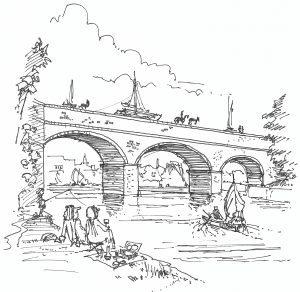
INDUSTRIAL REVOLUTION
Let’s talk of mills and mines. There was a whiff
Of revolution in the air, as if
Britain was poised on the very threshold
Of a new age. No one could have foretold
The scale of change, the suddenness, the speed,
The voracious energy and greed
Of the ‘Industrial Revolution’,
So-called. Ruin, disease, destitution,
Misery, ill health – these marched hand in hand
With a huge surge of wealth throughout the land:
The ‘white heat of progress’, you understand.
A steady growth in the population
After 1740 (the nation
Grew by an astonishing ten per cent,
Half a million, in twenty years) meant
Not only cannon fodder for the wars,
But cheap and plentiful labour. The laws
Were lax. There was no regulation,
No restraint on the exploitation
Of children or the vulnerable poor.
A complete free for all. This I deplore.
The century had worse horrors in store
Than were apparent at this early stage.
Indeed, as more folk lived to middle age
Through medical advances, and new wealth
(From trade) meant better economic health,
Men were optimistic. Agriculture
Was booming, with the dash for enclosure.
The state of the roads, a former disgrace,
Continued, we’re told, to improve apace,
With a large increase in turnpike trusts. Coke
Was first used by an enterprising bloke
Named Abraham Darby in the process
Of smelting, which saw a sea-change, no less,
In the production of iron. John Kay
Is a largely unsung hero, but hey,
His ‘flying shuttle’ speeded up the way
Weavers made cloth, a breakthrough in its day.
Halting advances, it has to be said,
Compared to the marvels that lay ahead,
But the seeds were being sown. Momentum
Was gathering. A perfect exemplum
Was James Brindley’s remarkable design
For a canal to travel in a line
From Worsley (the Duke of Bridgewater’s seat)
To Manchester, to ferry coal. Some feat.
Brindley, an illiterate engineer,
Was bright and forthright, a stranger to fear.
His waterway crossed the River Irwell
By bridge, at a height of forty feet. Well!
There were no locks. The water was contained
By high embankments. Imagine: untrained
And unlettered. How can this be explained?
Pure native genius, that’s what I say.
It could sadly never happen today.
The price of transporting Bridgewater’s coal
Was halved at a stroke – a blow, on the whole,
To the sceptics. Canals were here to stay.
Brindley was on a roll. Anchors aweigh!
Back to top / Buy the book
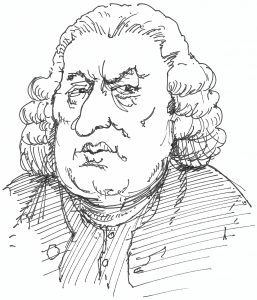
SAMUEL JOHNSON
The literary figure of the age
Was Samuel Johnson. Essayist, sage,
Critic and eccentric, his anecdotes,
Assertions, aphorisms and choice quotes
Have been immortalised by James Boswell
In his famous Life. Johnson cast his spell
Over literary London. “No love”
Had he “of clean linen”. Heavens above!
Yet I’ve read that a more clubbable man
Was not to be found. His career began
As a humble, lowly paid schoolmaster,
Unsuccessful (indeed, a disaster) –
Save for the odd fact that David Garrick
Was his early pupil. They seemed to click,
And both set out for London together
To try their luck, whatever the weather.
Garrick, the foremost actor of his time,
Drew the crowds at Drury Lane. In his prime
He gave his Lear to explosive acclaim.
The Doctor took longer to make his name.
Sam struggled. Oxford University
He left, with regret, without a degree,
Despite being hailed as a prodigy
In Latin and Greek. He was twenty-eight
When he left for London – that’s pretty late.
He laboured as a jobbing journalist –
Deadlines and drudgery, you get the gist –
Reporting tedious late-night debates
In the House of Commons. One hesitates
To dwell too long on his early career,
The Rambler the only highlight, I fear.
This was the Doctor’s own publication.
Its far from unhealthy circulation,
Twice weekly, topped five hundred. Politics,
Society, literature, ethics,
Religion – these were Johnson’s topics,
Explored as essays, often as stories,
And sometimes even as allegories.
A rare achievement, distinctive in tone,
Earnest in purpose, The Rambler’s alone.
Johnson’s Dictionary made his name,
Affording him lifelong honour and fame.
In two massive volumes, this giant work
Took our towering literary Turk
Nine years of toil to complete. It’s very long –
Some 42,000 entries. Right or wrong,
Sam could lapse from his serious mission
To slip in the odd, quirky definition
For light relief. “Oats” (he gives no sources):
“Which in England is given to horses,
“In Scotland to men.” And (he the best judge)
“Lexicographer: a harmless drudge”.
The Dictionary is tight. There’s no fudge,
No waffle. You’re left with that vital sense
Of Johnson’s lifetime of experience
In reading. He’d rarely finish a book
Or ever need to take a second look.
The Doctor nonetheless absorbed it all:
A photographic mind; total recall.
For Johnson was forty, never forget,
When he took up his challenge. I should bet
(Were I asked) that he could conjure at will
A quote, an instance, with consummate skill,
All from memory. It sends a small thrill
Down my spine. The ponderous French, one hears,
With forty ‘experts’, spent one hundred years
Compiling their lexicon. That’s quite sad.
Six amanuenses Samuel had.
Yes, that’s right, you heard me: six. He was paid
(For once) for his labours. I’m told he made
Fifteen hundred and seventy-five pounds.
That’s quite a sum, affording ample grounds,
I suspect, for this assertion (I quote):
“No man but a blockhead ever wrote
“Except for money.” Oh, would that were true!
But writing for pleasure is nothing new.
It’s not such a terrible thing to do.
Our Sam was a staunch Tory. He believed
That raising a worker’s wages relieved
Him not from poverty, but from hard graft.
In his judgement it was plain daft
To seek to make a labourer better
By paying him more, when the true debtor
Was society. It made men idle
To raise wages. It was suicidal.
His general outlook, I think you’ll find,
Was more reactionary still. “Mankind
“Are happier,” so Johnson opined,
“In a state of inequality
“And subordination.” Not pretty.
Still, to his credit, he loved his wife
And never tired of London life.
Back to top / Buy the book
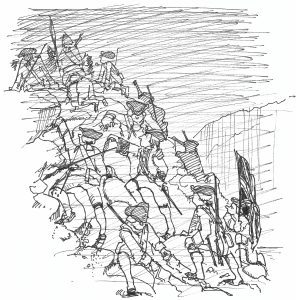
JAMES WOLFE
Wolfe was a commander hand-picked by Pitt.
The King would regularly throw a fit
As Will proposed a startling array
Of fresh new blood. But Pitt, as was his way,
Would press the deaf old King and win the day.
In Wolfe’s case, happily, it’s true to say
That George was pretty easily convinced.
Newcastle, I’ve read, positively winced
When Wolfe was tipped for senior command.
The King proffered this witty reprimand:
“Mad, is he? Then I hope that he will bite
“Some of my other generals!” Quite right.
George, on form, was an absolute delight.
Young James Wolfe had a talent fit to burst.
Valiant, sensitive and with a thirst
For discipline, he served under Amhurst
At Louisburg (Pitt’s appointment, of course).
A stickler for detail, a workhorse,
And yet physically frail, Wolfe, perforce,
Led by example. Under heavy fire,
He was first off the boats. This I admire.
So it was, on the 12th of September,
’59, truly a night to remember,
Wolfe prepared his men in an enterprise
Of rare strategic genius – the prize:
Quebec. Up the St. Lawrence, in small boats,
With muffled oars, he led his brave redcoats
(Some 5,000) under cover of dark.
No owl was heard to hoot, no dog to bark,
No gull to cry. The silence of the night
Bore but one sound. Wolfe was moved to recite
Gray’s Elegy. Madness? One of the signs?
Hardly. He’d rather have written these lines,
He told his fellows, than take Quebec. Well,
You can see why men fell under his spell.
Part of the British fleet, some miles away,
Began a bogus bombardment, to essay
A diversion, as Wolfe led the way
Up the Heights of Abraham – yes, a cliff.
There was no going back. Retreat? As if.
The French were taken wholly by surprise.
They woke on the 13th, rubbing their eyes,
To behold the Brits, complete with supplies
(And guns), apparently dropped from the skies.
The French were something of a rag-bag force:
A hard core of regular troops, of course,
But weakened by Indians (in war paint)
And local militia – somewhat quaint,
If the truth be told. Wolfe had little doubt,
Should he hold his nerve, he could put to rout
This ill-prepared detachment. He was right.
The French put up some semblance of a fight,
But were shot to pieces. And so, good night
To the French in Canada. Quebec fell.
James Wolfe’s fine triumph sounded their death knell.
Our hero was thrice wounded that day.
He died with honour and was heard to say,
“Now, God be praised,” (he knew the day was won)
“I will die in peace”. Wolfe’s place in the sun
Was ever assured. His duty was done.
Back to top / Buy the book
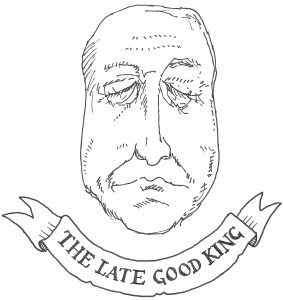
DEATH OF GEORGE THE SECOND
If this reads like an obituary,
So it is. Late in 1760,
On October the 25th, the King
Rose early (six o’clock in the morning),
Drank his daily cup of hot chocolate,
Then retired (as was also his habit)
To his privy. There he suffered a fit –
From a ruptured ventricle of the heart.
His valet de chambre gave quite a start
Upon hearing a noise “louder,” we’re told,
“Than the royal wind”. The King was out cold.
George the Second had fallen off the loo.
Nothing that the royal surgeons could do
Availed him one jot. They bled him, of course –
A treatment more fit to kill off a horse.
The King’s hour had come. Old, deaf and blind,
His passing was a mercy. Death was kind.
George has been neglected, I think you’ll find,
By posterity. “The late good old King,”
Was Pitt’s epitaph. More nauseating
Was Newcastle’s estimate (why pretend
That George had treated him well?): “the best friend
“That ever subject had.” Hypocrisy!
Cant! Compare Pitt: “…in an eminent degree
“He possessed justice, truth and sincerity.”
Now that sounds more honest and heartfelt to me.
George died sixteen days before his birthday,
His seventy-seventh. As is the way,
All eyes were turned to the new King. My view,
For what it’s worth, is that George the Third knew
Nothing! He was immature, twenty-two,
Cocksure and untutored. What did he do?
Well, for starters, he replaced Pitt with Bute,
The bumbling Earl, as thick as a boot,
Yet ‘in’ with the King. George may have been cute
And blessed with a certain swagger and flair,
But Britain, alas, was soon in despair.
The country was strong, its economy
Robust, a land of opportunity
And plenty. Folk gave credit to their King,
His fine example much to their liking.
For old George was courageous, loyal,
Beloved of his subjects. The perfect royal?
Well, hardly. To make such a claim were absurd,
But hold on to your hats. Bring on George the Third.
Back to top / Buy the book

